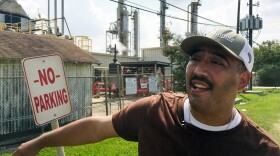
Rebecca Hersher
Rebecca Hersher (she/her) is a reporter on NPR's Science Desk, where she reports on outbreaks, natural disasters, and environmental and health research. Since coming to NPR in 2011, she has covered the Ebola outbreak in West Africa, embedded with the Afghan army after the American combat mission ended, and reported on floods and hurricanes in the U.S. She's also reported on research about puppies. Before her work on the Science Desk, she was a producer for NPR's Weekend All Things Considered in Los Angeles.
Hersher was part of the NPR team that won a Peabody award for coverage of the Ebola epidemic in West Africa, and produced a story from Liberia that won an Edward R. Murrow award for use of sound. She was a finalist for the 2017 Daniel Schorr prize; a 2017 Pulitzer Center on Crisis Reporting fellow, reporting on sanitation in Haiti; and a 2015 NPR Above the Fray fellow, investigating the causes of the suicide epidemic in Greenland.
Prior to working at NPR, Hersher reported on biomedical research and pharmaceutical news for Nature Medicine.
-
Scott Pruitt will no longer lead the Environmental Protection Agency, President Trump announced Thursday afternoon via Twitter.Pruitt was among the most…
-
The EPA intends to block rules to prevent and respond to leaks, explosions and other disasters at chemical facilities and refineries around the U.S. That scares many people who live and work nearby.
-
Hurricanes are moving more slowly than they used to. That means storms are dumping more rain and doing more damage when they make landfall, as Hurricane Harvey did when it lingered over Houston.
-
The EPA says the San Jacinto Waste Pits near Houston no longer needs Scott Pruitt's personal attention due to progress on a remediation plan. But the site is still years away from being cleaned up.
-
Hurricane Harvey caused industrial facilities to release an extra 5.98 million pounds of air pollution. Some people who live and work near the plants are frustrated with the federal response.
-
Some residents and first responders are suing the chemical company Arkema, saying it didn't do enough to protect them from fires that started at one of its plants near Houston after Hurricane Harvey.
-
Hurricane Harvey dumped 50 inches of rain on parts of Houston. Scientists are now trying to identify contaminants spread by the storm, including those in mud at the bottom of the Houston Ship Channel.
-
Environmental officials are inspecting toxic waste sites in southeast Texas that were flooded and potentially damaged last week.
-
As America prepares for the eclipse on Aug. 21, here are some basic facts about the phenomenon.
-
The administration will not direct public schools to allow students to use facilities that match their gender identities. It notes the primary role of state and local districts in education policy.










